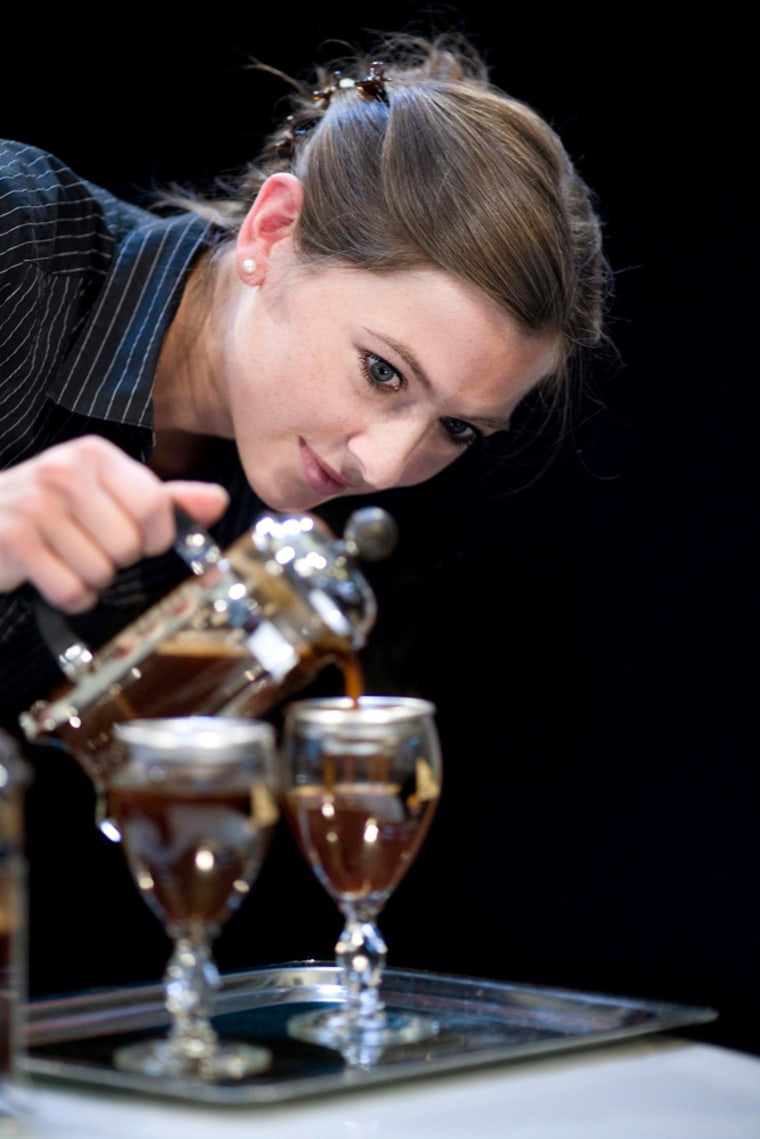When Pete Licata started working at a suburban Kansas City coffee shop in early 2003, he was looking for a job — any job — not a career or a lifestyle.
He got it anyway.
Today, Licata is an award-winning barista, one of a growing number of professional coffee makers around the nation who obsess over the precision grinding and tamping involved in pulling that elusive perfect shot of espresso.
"I tell people that I make it safe to drive in the morning," says Licata, a 30-year-old who calls his work "the daytime bartender job."
Being a barista has come a long way since Starbucks Corp. first brought the latte to mainstream America during the 1990s. Today's baristas aren't just slinging joe as a part-time job; many consider it a career, go through extensive training, face off in competitions and trade tricks at Web sites such as baristaexchange.com.
"It is much less a college job to make beer money now," Barista Magazine editor Sarah Allen says in an e-mail. "Most baristas in independent shops are pals outside of work. They share music and movie tastes. And they geek about coffee."
Not just a job
Though specific figures are elusive, the number of baristas in the U.S. has grown dramatically in recent years along with the coffee shop industry, says Mike Ferguson, spokesman for the Specialty Coffee Association of America.
Eight years ago, there were about 10,000 coffee shops. Today, it's 25,000, each employing about five baristas, Ferguson says.
And growth has come despite tough economic times. Starbucks recently said it will close 600 stores, but at the end of June, coffee orders at restaurants were up 5 percent over last year, says Harry Balzer, vice president of consumer research firm NPD Group.
Nicholas Cho, owner and head barista at Murky Coffee in Burlington, Va., says the job once was considered barely better than working the counter at a fast-food joint — part-time work for teenagers looking to make a few dollars.
But as more Americans have discovered how complicated coffee can be, Cho says the job has become more respectable and attracts intelligent young people who aren't interested in mainstream office jobs.
Some liken the job to that of a sommelier, who specializes in wine service, or even a chef at a fancy restaurant.
"The mentality that the chef has about their food and their preparation is starting to become the same mentality that the barista has about their coffee and the preparation of their coffee," says Cindy Chang, director of development for Counter Culture Coffee, a Durham, N.C.-based specialty coffee roaster.
Preparing perfect espresso requires exact timing, the right grind (requiring repeated equipment adjustments dependent on the weather) and proper temperature for both the coffee and the milk.
Some baristas, like Licata, learn their trade from the coffee shops where they work. Some coffee shops even have six-month training programs, during which employees aren't allowed to make a drink.
Others turn to places such as the American Barista & Coffee School in Portland, Ore., which offers a six-day course that trains people to teach employees in their own shops.
"The days are over where you can just put an espresso sign in your window and sell coffees," says Matt Milletto, director of training at the school.
Since the school opened four years ago, it has had about 600 graduates, most of whom wanted the training so they could teach their own coffee shop staffs, says Milletto. A six-day class that covers barista and business management training costs $2,995, while the four-day barista only class costs $1,795.
"There's an infinite amount to learn about coffee," says Milletto, who also runs the barista social networking Web site baristaexchange.com. "And, really, I think people fall in love with not only the quality aspects of serving a kind of a more specialty or gourmet beverage, but it's also the community that goes along with it."
Taking coffee more seriously
Even premier cooking schools, such as the Culinary Institute of America in Hyde Park, N.Y., are taking coffee more seriously. Last year, the institute began a partnership with Counter Culture Coffee to upgrade its coffee curriculum. The school plans to provide barista training to every pastry and baking arts student.
The world of baristas also has its own competitions that test the skills of the world's best coffee makers.
The first international championship was held in Norway in 2000 with just a dozen competitors from around the world. At this year's competition in Denmark, 51 countries were represented. Next year's event will be held in Atlanta.
Licata, who manages PT's Coffee shop near the University of Kansas campus in Overland Park, twice has placed second in the U.S. Barista Championship, which is run by the Specialty Coffee Association of America.
For Licata, learning to make good coffee has been a yearslong process. Though he won his first competition — the Midwest Regional Barista Championship — in 2005, only months after he started training for it, he says he doesn't think he was "really, really good" until the past couple years, as he became more consistent and gained more knowledge.
Now, he insists, he can make something for anyone.
"The one that I like, that I actually have people tell me all the time is: 'This is some of the best coffee I've ever had in my life.' And that, that makes me happy. That makes my job worthwhile."
